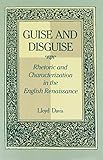Guise and Disguise : Rhetoric and Characterization in the English Renaissance / Lloyd Davis.
Material type: TextPublisher: Toronto : University of Toronto Press, [1993]Copyright date: ©1993Description: 1 online resource (224 p.)Content type:
TextPublisher: Toronto : University of Toronto Press, [1993]Copyright date: ©1993Description: 1 online resource (224 p.)Content type: - 9780802029560
- 9781442675575
- 822/.309/3
- online - DeGruyter
| Item type | Current library | Call number | URL | Status | Notes | Barcode | |
|---|---|---|---|---|---|---|---|
 eBook
eBook
|
Biblioteca "Angelicum" Pont. Univ. S.Tommaso d'Aquino Nuvola online | online - DeGruyter (Browse shelf(Opens below)) | Online access | Not for loan (Accesso limitato) | Accesso per gli utenti autorizzati / Access for authorized users | (dgr)9781442675575 |
Browsing Biblioteca "Angelicum" Pont. Univ. S.Tommaso d'Aquino shelves, Shelving location: Nuvola online Close shelf browser (Hides shelf browser)

|

|

|

|

|

|

|
||
| online - DeGruyter Guardians of the Transcendent : An Ethnography of a Jain Ascetic Community / | online - DeGruyter Gudea and his Dynasty / | online - DeGruyter Guido Cavalcanti : The Other Middle Ages / | online - DeGruyter Guise and Disguise : Rhetoric and Characterization in the English Renaissance / | online - DeGruyter 'Hang Onto These Words' : Johnny David's Delgamuukw Evidence / | online - DeGruyter Hannah Arendt : Life Is a Narrative / | online - DeGruyter Harnessing Labour Confrontation : Shaping the Postwar Settlement in Canada, 1943-1950 / |
restricted access online access with authorization star
http://purl.org/coar/access_right/c_16ec
Disguise is a recurring figure in many Renaissance texts. In its apparent intention to deceive, it raises complex issues of identity, motivation, and the construction of character. Lloyd Davis's Guise and Disguise examines disguise as a rhetorical and dramatistic motif in a wide range of Renaissance texts. Drawing on the sociological analyses of character in the work of Goffmann and Garfinkel as well as on recent historicist studies of Renaissance literature, Davis argues against an essentialist notion of identity. He posits a counter-tradition of character as invented, shaped guise, a cultural process realized through rhetorical and dramatic performance.Davis traces the conflict between idealist and cultural notions of selfhood fromits classical roots to its role as a key social concern in the English Renaissance. He analyses rhetorical texts from Wilson, Rainolds, Puttenham, and Sidney; the political and social philosophies of Machiavelli, Castiglione, Montaigne, Bacon, and Hobbes; the religious writings of Erasmus, Calvin, and Donne; and the dramatic works of Lyly, Shakespeare, Marston, Jonson, and Beaumont and Fletcher. He sees issues of selfhood and identity as central to the period's ideological and gender discourses, and strategies of disguise and character-making as challenging the political and sexual motives that underlie imags of the essentialist self. Davis's approach links Renaissance culture both to its past and to modern and post-modern notions of subjectivity and language.
Mode of access: Internet via World Wide Web.
In English.
Description based on online resource; title from PDF title page (publisher's Web site, viewed 01. Nov 2023)


